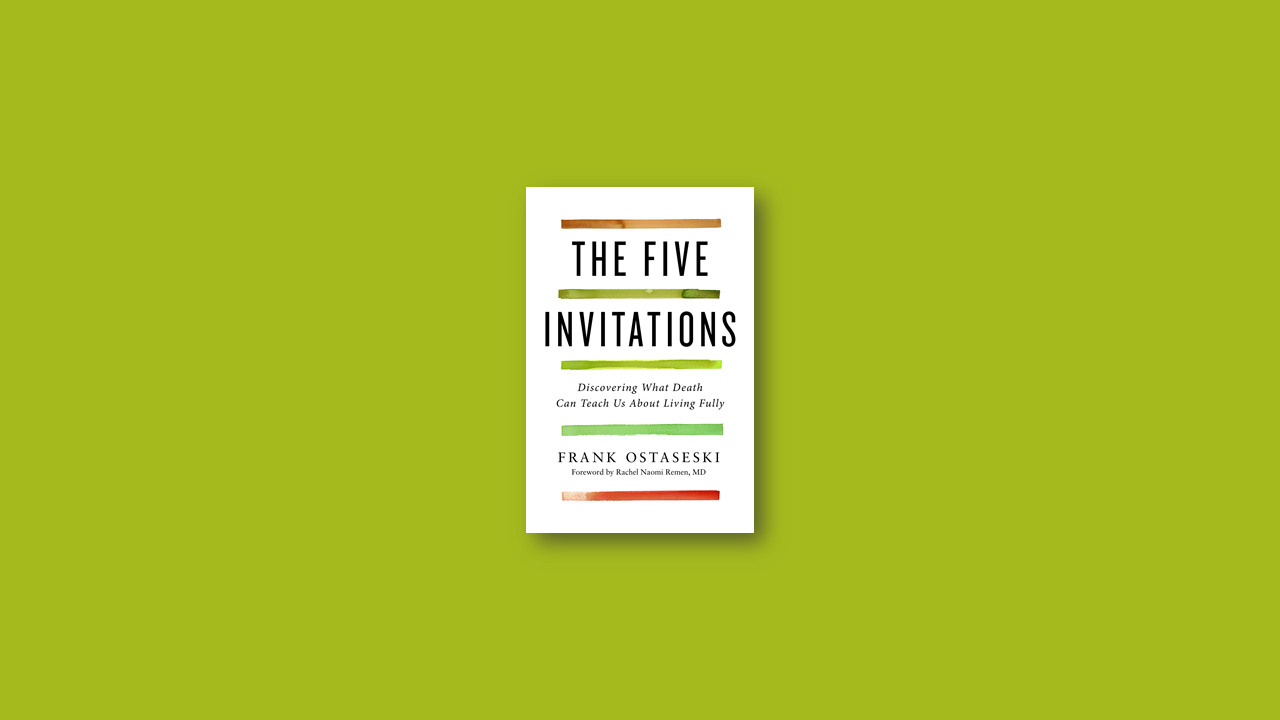Frank Ostaseski is a Buddhist teacher and a leader in the field of end-of-life care. The five invitations are Frank’s attempt to honor the lessons he has learned sitting bedside with so many dying patients.
These invitations are mutually supportive principles, permeated with love. They are equally relevant guides to living a life of integrity. They can be applied just as aptly to people dealing with all sorts of transitions and crises—from a move to a new city, to the forming or releasing of an intimate relationship, to getting used to living without your children at home. Here’s a big picture of the five invitations:
- Don’t wait.
- Welcome everything, push away nothing.
- Bring your whole self to the experience.
- Find a place of rest in the middle of things.
- Cultivate the ‘don’t know’ mind.
Invitation #1 Don’t Wait
The Doorway to Possibility
Our lives are not solid and fixed. Knowing this intimately is how we prepare for death, for loss of any kind, and how we come to fully embrace constant change. We are not just our past; we are becoming. We can release grudges. We can forgive. We can free ourselves of resentment and regret before we die.
Don’t wait. Everything we need is right in front of us. Impermanence is the doorway to possibility. Embracing it is where true freedom lies.
Luckily, we don’t have to wait until we are sick or dying to embrace our own impermanence. Any major life-changing event provides us with this opportunity.
Invitation #2 Welcome Everything, Push Away Nothing
Accepting life as is means that we make peace with things as they are rather than trying to force them to be the way we want them to be (and getting frustrated that we can’t). Instead of spinning a story that we then try to live into, we open to a way things are and accept that we are completely human.
If you are alive, you will experience pain. Everyone has a different pain threshold, and yet we all experience it throughout our lives. There is pain, from which there is no escaping. And then there is suffering, which we can do something about. Many times, we have no control over the stimulus that causes us pain. But we can shift our relationship to the thoughts about and emotional reactions to the pain, which frequently intensify our suffering
Invitation #3 Bring Your Whole Self to the Experience
To be whole, we need to include, accept, and connect all parts of ourselves. We need acceptance of our conflicting qualities and the seeming incongruity of our inner and outer worlds.
Wholeness does not mean perfection. It means no part left out.
With acceptance, what emerges is a deep trust in what is. We release ourselves completely from the comparison, assessment, and rejection of the inner critic. We stop blaming ourselves for having desires and wants, and instead accept these desires as a flavor of love, one that expresses our hearts’ deepest longing for what is true and real.
Invitation #4 Find a Place of Rest in the Middle of Things
We often think of rest as something that will come to us when everything else in our lives is complete: at the end of the day, when we take a bath; once we go on holiday or get through all our to-do lists. We imagine that we can only find rest by changing our circumstances.
Finding a place of rest isn’t about adding another task to your already too-long to-do list. Nor does it mean napping more during your workday (though this may prove helpful).
Rest is a choice—a choice to be alert, to bring your attention to this moment.
Multitasking is a myth that only serves to seize our attention and exhaust us. At the end of the day, it is neither enjoyable nor productive. Let’s face it: none of us have that superpower; we can only live in one moment at a time.
Resting in this open awareness, we release ourselves from the habits of managing our circumstances and striving for control as ways to avoid pain and gain pleasure. We have more space, more freedom from reactivity. We are not denying, justifying, or rationalizing; we are allowing.
Invitation #5 Cultivate Don’t Know Mind
Ignorance is usually thought of as the absence of information, being unaware. But it’s more than just “not knowing.” It means that we know something, but it is the wrong thing. Ignorance is misperception. The ‘don’t know’ mind represents something else entirely. It is beyond knowing and not knowing. As Zen master Suzuki Roshi famously said,
“In the beginner’s mind there are many possibilities, but in the expert’s there are few.”
The ‘don’t know’ mind is not limited by agendas, roles, and expectations. It is free to discover. When we are filled with knowing, when our minds are made up, it narrows our vision, obscures our ability to see the whole picture, and limits our capacity to act. The wise person is both compassionate and humble and knows that she does not know.
This moment right here before us, this problem we are tackling, this person who is dying, this task we are completing, this relationship we are building, this pain and beauty we are facing—we have never experienced it before. When we enter a situation with the ‘don’t know’ mind, we have a pure willingness to do so, without attachment to a particular view or outcome. We don’t throw our knowledge away but we let go of fixed ideas. We let go of control. Don’t know mind is an invitation to enter life with fresh eyes, to empty our minds and open our hearts.

